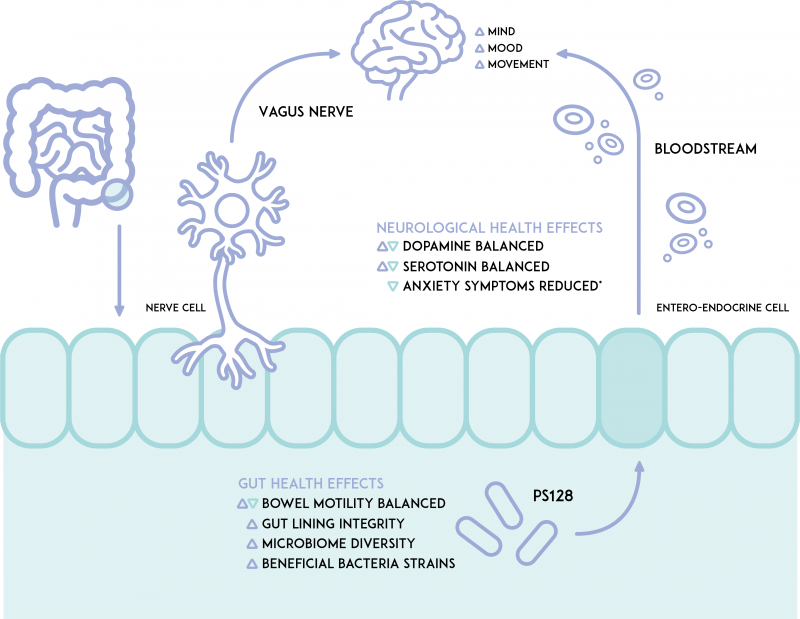3 Reasons to Consider a Daily Probiotic Supplement for Parkinson’s
Written by |

Your intestinal tract is home to the gut microbiome. These trillions of micro-organisms aid digestion and help maintain a healthy gastrointestinal (GI) tract. But they can also have more far-reaching effects because of the intimate connection between gut and brain. This means that when the gut microbiome is unbalanced, it can affect mind, mood and movement, and not just digestion.
Thankfully, we have a useful tool for restoring and maintaining balance in the microbiome — probiotics. They provide a measured dose of one or more strains that have a particular beneficial effect on human health. While they can be useful for anyone, there are three ways a daily probiotic could help people with PD.
1/ Gut health probiotics for constipation
Constipation and other gastrointestinal problems are very common non-motor symptoms of PD. Fortunately, many strains of probiotic bacteria can stimulate intestinal motility and help with constipation. In fact, probiotics have been recommended by the Movement Disorders Society Evidence‐Based Medicine Committee as a clinically useful therapeutic option for the treatment of constipation in PD (Seppi 2019).
Seek out a probiotic supplement from a reputable company that has been shown to have a beneficial effect on gut health and see if it helps you. You may notice gas, bloating or changes in stool consistency as you first begin using any probiotic. These symptoms should subside within a week or two. You should expect to experience better digestion as the probiotics repair your gut and stimulate more healthy intestinal movement.
2/ Neurological health probiotics for mood and movement
Parkinson’s is caused by progressive loss of dopamine-synthesizing neurons in the substantia nigra region of the brain. Interestingly, intestinal cells and some probiotic bacteria can also make dopamine and its precursors. In fact, preclinical studies of the neurologically active probiotic strain L. plantarum PS128 suggest it’s able to increase dopamine levels in key regions of the brain. PS128 also appeared to be neuroprotective in studies with animals, reducing the loss of dopamine-producing neurons in a 4-week study (Liao 2020).
Can PS128 help people with PD? In a recent pilot study of 25 people with Parkinson’s, each participant took 60 billion CFU of PS128 before bed for 12 weeks. Participants continued to take their usual doses of levodopa and any other anti-parkinsonian drugs during the study. Most participants reported shorter “off” periods, fewer motor symptoms during both “on” and “off” periods, and better overall quality of life when taking PS128* (Lu 2021). A larger randomized controlled trial studying the benefits of PS128 for PD is currently underway. PS128 is available as Neuralli from Bened Life.

3/ Gut health probiotics to prevent or slow Parkinson’s onset
Constipation and IBS-like symptoms often appear up to a decade before motor symptoms are seen and a Parkinson’s diagnosis is made. Evidence suggests that at least for some people, Parkinson’s may begin as gut dysbiosis. An unbalanced gut microbiome causes inflammation, can cause the production of aberrant α‐synuclein particles in the gut, and impairs gut health. The α‐synuclein particles later move to the brain via the vagus nerve, where they can cause neuron death (Metta 2021).
Could probiotics help correct the initial gut dysbiosis that eventually leads to Parkinson’s Disease? This is a very intriguing question that has not yet been answered by clinical science. However, the link between GI symptoms and Parkinson’s suggests that GI symptoms should not be ignored. It is well worth addressing any long-standing constipation or other problems with a healthy diet, gut-health probiotics and/or medical care rather than allowing them to go untreated.
Empower your gut!
Probiotics may be a helpful addition to your daily routine for better gut health and/or neurological health. We encourage you to try one or more strains with good science behind them to see if they help you.
Interestingly, probiotics may prove to be useful for PD in even more ways in the future, including helping with better absorption of levodopa (Perez-Pardo 2017). With each passing year, science continues to offer more and more reasons to consider probiotics for PD.
*These statements have not been evaluated by the Food and Drug Administration. This product is not intended to diagnose, treat, cure, or prevent any disease.
References
Lu CS, Chang HC, Weng YH, et al. The Add-On Effect of Lactobacillus plantarum PS128 in Patients with Parkinson’s Disease: A Pilot Study. Front Nutr. 2021. 8:650053. https://doi.org/10.3389/fnut.2021.650053.
Liao JF, Cheng YF, You ST, et al. Lactobacillus plantarum PS128 alleviates neurodegenerative progression in 1-methyl-4-phenyl-1,2,3,6-tetrahydropyridine-induced mouse models of Parkinson’s disease. Brain Behav Immun. 2020. 90:26-46. https://doi.org/10.1016/j.bbi.2020.07.036.
Metta V, Leta V, Mrudula KR, et al. Gastrointestinal dysfunction in Parkinson’s disease: Molecular pathology and implications of gut microbiome, probiotics, and fecal microbiota transplantation. J. Neurol. 2022. 269(3):1154-1163. https://doi.org/10.1007/s00415-021-10567-w.
Perez-Pardo P, Kliest T, Dodiya H, et al. The gut-brain axis in Parkinson’s disease: Possibilities for food-based therapies. Eur J Pharmacol. 2017. 817:86-95. https://doi.org/10.1016/j.ejphar.2017.05.042.
Seppi K, Chaudhuri KR, Coelho M, et al. Update on treatments for nonmotor symptoms of Parkinson’s disease—an evidence-based medicine review. Movement Disord. 2019. 34(2):180-198. https://doi.org/10.1002/mds.27602.


